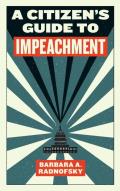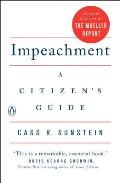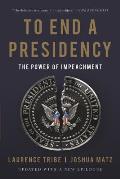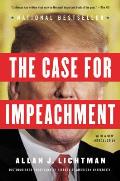
 Impeachment is dominating the news and it’s not likely to stop anytime soon. Even according to the Founders impeachment is a political process, but it’s a critically important constitutionally authorized process as well. We wanted to pass along a book that shed some light on this complex issue but couldn’t find one, so instead we’re passing along several for you to choose from…
Impeachment is dominating the news and it’s not likely to stop anytime soon. Even according to the Founders impeachment is a political process, but it’s a critically important constitutionally authorized process as well. We wanted to pass along a book that shed some light on this complex issue but couldn’t find one, so instead we’re passing along several for you to choose from…
 Citizens Guide to Impeachment, by Barbara Radnofsky
Citizens Guide to Impeachment, by Barbara Radnofsky
In a straightforward, non-partisan approach, a leading legal expert details a precise understanding of the rules and history of impeachment. Spotlighting in particular the precise rules of impeachment — including an explanation of the crucial grounds for impeachment, the famous “high crimes and misdemeanors” — the book also details the origins of those rules as set out by the founding fathers in the Constitution, and the history of their application throughout the history of our democracy. Scrupulously avoiding the advocacy of impeachment toward any particular politician (the words “Trump” and “Obama” do not appear in the text) the book proves a fascinating read about a unique aspect of our democracy, as well as a useful, one-of-a-kind guide for citizens in a participatory government.
 Impeachment: A citizen’s guide, by Cass Sunstein
Impeachment: A citizen’s guide, by Cass Sunstein
Harvard Law professor Cass R. Sunstein provides a succinct citizen’s guide to this essential tool of self-government. Taking us deeper than mere partisan politics, he illuminates the constitutional design behind impeachment and emphasizes the people’s role in holding presidents accountable. In spite of the loud national debate between pundits and politicians alike over whether or not to impeach Trump, impeachment remains widely misunderstood. Sunstein identifies and corrects a number of common misconceptions. For example, he shows how the Constitution, not the House of Representatives, establishes grounds for impeachment, and that the president can be impeached for abuses of power that do not violate the law. Even neglect of duty counts among the “high crimes and misdemeanors” delineated in the republic’s foundational document.
 Impeachment: An American History, by Engel, Meacham, and Naftali
Impeachment: An American History, by Engel, Meacham, and Naftali
In the first book to consider these three presidents (Johnson, Nixon, Clinton) alone, and the one thing they have in common, Jeffrey Engel, Jon Meacham, Timothy Naftali, and Peter Baker explain that the basis and process of impeachment is more political than it is a legal verdict. The Constitution states that the president, “shall be removed from Office on Impeachment for, and Conviction of, Treason, Bribery, or other high Crimes and Misdemeanors,” leaving room for historical precedent and the temperament of the time to weigh heavily on each case. These three cases highlight factors beyond the president’s behavior that impact the likelihood and outcome of an impeachment: the president’s relationship with Congress, the power and resilience of the office itself, and the polarization of the moment. This is a realist, rather than hypothetical, view of impeachment that looks to history for clues about its future–with one obvious candidate in mind.
 To End a Presidency The Power of Impeachment, by Laurence Tribe and Joshua Matz
To End a Presidency The Power of Impeachment, by Laurence Tribe and Joshua Matz
To End a Presidency addresses one of today’s most urgent questions: when and whether to impeach a president. Laurence Tribe and Joshua Matz provide an authoritative guide to impeachment’s past and a bold argument about its proper role today. In an era of expansive presidential power and intense partisanship, we must rethink impeachment for the twenty-first century. Of impeachments, one Constitutional Convention delegate declared, “A good magistrate will not fear them. A bad one will be kept in fear of them.” To End a Presidency is an essential book for all Americans seeking to understand how this crucial but fearsome power should be exercised.
 The Case for Impeachment, by Allan Lichtman
The Case for Impeachment, by Allan Lichtman
In the fall of 2016, Allan Lichtman–the Distinguished Professor of History at American University who has correctly forecasted thirty years of presidential outcomes–made headlines when he predicted that Donald J. Trump would defeat Hillary Clinton, to win the presidency. In this timely, considered volume, written in clear, nonpartisan terms, Lichtman lays out the reasons Congress could remove Trump from the Oval Office: his ties to Russia before and after the election and his possible obstruction of the investigation–including firing F.B.I. Director James Comey–the complicated financial conflicts of interest at home and abroad violating the Constitution’s Emoluments Clause, and his abuse of executive authority.










